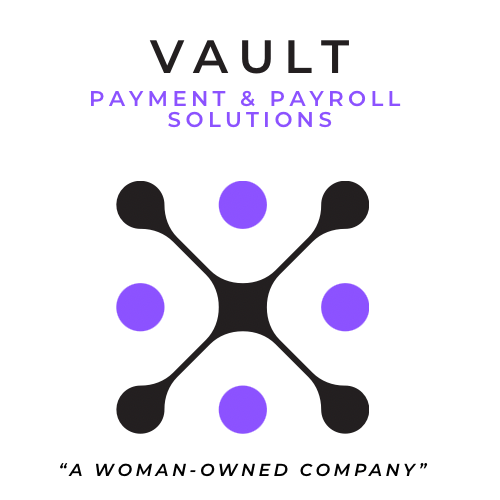It’s 2025, and credit card processing still directly impacts your small business cash flow, customer satisfaction, and overall business growth. While that’s true, efficient credit card payment processing systems can increase business profitability, improve customer experiences and internal operations. As a business owner you’re probably already aware that some credit card processing options can lead to high fees, security risks, and compliance issues, but let’s also explore the positive benefits.
This guide is built to provide Maryland small businesses with a full overview of credit card payment processing systems, including fee management, legal compliance, optimization strategies, and tips from Vault Consulting & Payment Solutions. Keep reading to equip your Maryland small businesses with actionable strategies to increase profitability and growth for 2025.
The Breakdown of How Credit Card Processing Works
Credit card processing involves several key parts, including payment merchant providers, credit card payment processors, issuing banks, and credit card payment processing networks. In order to choose the most cost-effective credit card payment processing solution while keeping fees low, we need to understand how the different parts interact with each other.
What Are the Most Important Parts of Credit Card Payment Processing?
Credit card payment processing includes five main components:
- Maryland Small Businesses: The Maryland small business accepting the credit card payment, which is you!
- Your Small Business’s Customer: The cardholder initiating the credit card payment transaction will be your customers.
- Credit Card Payment Processor: This payment processor manages the payment transaction data between the small business, credit card network, and the customers issuing bank.
- Credit Card Payment Network: Visa, Mastercard, American Express, or Discover, which facilitate the transaction.
- Your Customers’ Issuing Bank: The bank that issued the customer’s credit card approves or declines the transaction.
How Are Credit Card Payments Processed?
When your small business has a credit card payment transaction the process involves:
- Credit Card Payment Authorization: Your customer gives their credit card information, and the payment processor requests approval from the issuing bank.
- Credit Card Payment Authentication: The credit card payment network verifies the credit card details and checks for fraud.
- Credit Card Payment Approval or Decline: The customers issuing bank approves or declines the credit card payment.
- Credit Card Payment Clearing and Settlement: If the credit card payment is approved, the transaction will be cleared, and funds are transferred to your Business’ account.
- Credit Card Payment Funding: Your Business receives the payment after fees are deducted.
How Does Credit Card Payment Processing Affect My Small Business?
Small Maryland business owners that have an understanding of the main parts of credit card payment processing have an advantage in managing credit card payment processing costs and providing smooth payment transactions for customers. Credit card payment processors securely handle payment data, influencing transaction speed and security. Having a quick and easy credit card payment transaction increases customer satisfaction across the board.
Choosing the Right Credit Card Payment Processing System for Your Small Business
Selecting the right credit card payment processor involves investigating what your small business’ transaction average amount is. As well as knowing what credit card payment pricing models, contract terms, and integration capabilities are best for your business. Maryland businesses should consider credit card payment solutions that cater to local regulations and customer expectations.
What Should Small Businesses Consider When Choosing a Credit Card Payment Processor?
- Credit Card Payment Pricing Models: Flat-rate, interchange-plus, or tiered pricing models, can assist with cash flow and increased customer satisfaction.
- Credit Card Payment Processing Contract Terms: Look for flexible, no-cancellation-fee credit card payment processing contracts.
- Credit Card Payment Processing Customer Support: Your credit card payment processing provider should offer 24/7 support for troubleshooting.
- Credit Card Payment Processing Security Features: When looking for a credit card payment processor, make sure the processor is compliant with PCI DSS standards for data protection.
Which Credit Card Payment Pricing Model is Best for Your Small Business?
- Flat-rate Credit Card Payment Pricing: This pricing model is ideal for small businesses with consistent credit card payment processing transactions.
- Interchange-Plus Credit Card Payment Pricing: Interchange-Plus credit card payment pricing provides transparency and cost savings for small businesses with high credit card payment processing transactions.
- Tiered Credit Card Payment Pricing: Tiered credit card payment pricing varies by credit card payment type, which can be complicated and less transparent.
How Can Small Businesses Compare Credit Card Payment Processing Providers?
- Request Detailed Credit Card Payment Processing Quotes: Compare all payment processing fees, including interchange, markup, and incidental fees.
- Read Reviews and Testimonials of Payment Processing Providers: Learn from other small business owners? experiences on what works and doesn’t work for small business credit card payment processing.
- Check Credit Card Payment Processing Integration Options: Make sure that the credit card payment processor integrates with your point-of-sale system or e-commerce platform.
States differ when it comes to credit card payment processing regulations. Maryland small businesses should be aware of Maryland-specific options to best choose the right credit card payment processor.
Simplifying and Managing Credit Card Payment Processing Fees for Small Business
Credit card payment processing fees can heavily impact your small business profits. Mastering the different types of payment processing fees, while implementing cost management techniques will improve cash flow and profits for your Maryland small business.
What Are The Different Types of Credit Card Payment Processing Fees for Small Business?
There are three primary types of credit card payment processing fees:
- Interchange Payment Processing Fees: Interchange payment processing fees are set by the credit card payment networks like Visa and Mastercard. These set payment processing fees end up being the bulk of the cost of fees.
- Assessment Payment Processing Fees: Assessment payment processing fees are smaller fees charged by credit card payment networks to cover operational expenses for the credit card payment transaction.
- Payment Processor Markups: Processor markups are additional fees added by the credit card payment processor, which will vary by payment processing provider.
Can Small Businesses Negotiate Lower Credit Card Payment Processing Fees?
Yes, Absolutely! Your small business can negotiate credit card payment processing fees by shopping around to compare multiple payment processor providers and negotiate for better rates. Another tactic small business owners use to negotiate their payment processing fees down is to increase their credit card payment transaction volume. For some payment processing providers, higher payment processing volumes may qualify for lower rates.
Another popular strategy for small businesses to lower credit card payment processing fees is by using the interchange-plus pricing model which allows for more transparency and negotiation power.
Small Business Strategies to Reduce Credit Card Payment Processing Costs
Cost management strategies include choosing the right credit card payment pricing model. This can also incorporate surcharging or cash discounts, and regularly auditing credit card payment processing statements for hidden payment processing fees.
How Can Small Businesses Reduce Credit Card Payment Processing Fees?
In order for your small business to choose the right credit card payment pricing model, you should discuss the different credit card payment pricing models with your payment processing provider. Small businesses often choose interchange-plus because it’s often more cost-effective. Negotiating with your payment processing provider is also an option if your credit card payment processing volume is high as we mentioned above. It? s also a good practice to regularly review and audit your businesses payment processing statements for hidden or incorrect fees.
What is Interchange-Plus Pricing, and How Does it Save My Small Business Money?
Interchange-plus payment processing pricing separates interchange fees from payment processor markups. This allows small businesses to have more pricing transparency and cost control, compared to tiered or flat-rate pricing.
Are Surcharges or Cash Discounts Legal for Small Businesses in Maryland?
Yes, Maryland allows businesses to add surcharges to payment transactions or offer discounts for cash payments, as long as they comply with disclosure requirements. Proper signage and clear communication to customers explaining payment options is mandatory.
For more cost-saving tips, visit How to Optimize Your Payment Processing for Small Business.
The Vault Consulting & Payment Solutions Advantage for Credit Card Payment Processing
Vault Consulting & Payment Solutions offer tailored credit card processing payment systems for Maryland small businesses, featuring:
- Transparent Credit Card Payment Processing Pricing Models: No hidden payment processing fees.
- Customized Credit Card Payment Processing Solutions: Designed to match specific Maryland small business needs.
- Ongoing Credit Card Payment Processing System Support: 24/7 customer service and regular credit card payment processing statement reviews.
Take control of your credit card payment processing systems and see how it can work to small businesses’ advantage. Contact Vault Consulting & Payment Solutions for a free consultation.
Also Read

